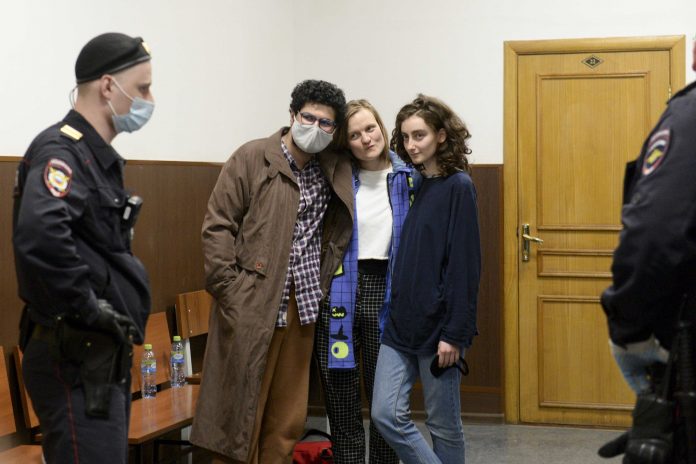
By DARIA LITVINOVA
Associated Press
MOSCOW (AP) — Russian authorities levied criminal charges Wednesday against four young editors of an online student magazine that had coverage about the nationwide protests supporting jailed opposition leader Alexei Navalny earlier this year.
Police raided the Moscow apartments of the four DOXA magazine editors as well as the apartments of two of the editors’ parents and the magazine’s offices. The four were taken to Russia’s Investigative Committee for questioning and charged with encouraging minors to take part in illegal activity, according to DOXA and a human rights group involved in their defense.
DOXA said the law enforcement actions were connected to a video the magazine ran about the January protests organized in support of Navalny. Mass protests engulfed cities across Russia’s 11 time zones for two weekends in a row in January and were the biggest in recent years, posing a major challenge for the Kremlin.
The video talked about the pressure school and university students faced before the protests and described threats of expulsion for participating in the demonstrations unlawful. Russia’s media and internet watchdog, Roskomnadzor, demanded DOXA delete the video several days after it ran in late January, alleging that it contained information encouraging minors to take part in illegal activity.
The magazine complied, but filed a lawsuit to contest the order, with the four editors — Armen Aramyan, Natalya Tyshkevich, Vladimir Metelkin and Alla Gutnikova — among the plaintiffs.
DOXA said Wednesday that the video contained “no calls for unlawful actions — we were saying that young people shouldn’t be afraid to express their opinion.”
“The pressure the journalist community has faced recently is unprecedented, but we won’t stop our work. We will continue to cover what’s important for young people and will continue to stand up for their rights,” the magazine’s statement read.
The charges against the four editors carry potential criminal penalties of up to three years in prison. They are part of the same criminal case Russian authorities opened against Navalny’s chief strategist, Leonid Volkov, who was accused of encouraging minors to take part in unauthorized rallies, according to Damir Gainutdinov, head of the Net Freedoms Project of the Agora human rights organization.
Volkov, who left Russia in 2019, has rejected the charges, and on Wednesday relayed “unconditional respect and support” to DOXA’s team in a Facebook post. Agora is providing legal representation for three of the four editors.
A court on Wednesday afternoon was set to decide on pre-trial restrictions for the DOXA editors. Dozens of supporters gathered in front of the courthouse in central Moscow; many carried banners saying “We are DOXA” and “Get your hands away from DOXA.”
The crackdown on DOXA came several days after police searched the apartment of a prominent investigative journalist, Roman Anin, chief editor of the Vazhniye Istorii website. The website said the raid likely involved a 2016 story Anin wrote for the independent newspaper Novaya Gazeta that alleged a lavish super-yacht belonged to Igor Sechin, head of Russian state oil company Rosneft.
Novaya Gazeta was ordered to retract the story as a result of a civil court case, but a criminal case in the matter has been pending for years.
Agora’s Gainutdinov said that while the two events were not directly connected, they clearly show that “coverage of some important issues — protests, corruption, and so on — is perceived as hostile criminal activity, so none of the journalists who honestly do their job can feel safe now.”



















